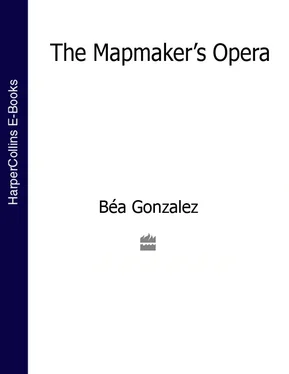She begins—
In a town in the heart of La Mancha, home to Don Quijote and his windmills, to long afternoons and silent, silent nights, the Clemente family lived for centuries, their fortunes tied to those of a plant: the Crocus sativus— from whose dried stigma comes saffron, the world’s most precious spice. What you may not know is that it takes 160,000 flowers to produce just one kilogram of this culinary bit of gold. When Mónica Clemente left La Mancha for the narrow streets of Seville, she carried the taste of saffron forever on her tongue. More than any bucolic recollections of childhood, Mónica’s memories were imbued with the taste of saffron soups, saffron stews and most of all, the sublime paellas of her Aunt Bautista, who always knew instinctively the precise amount to be placed into the olla, where the chicken, chorizo and thirteen other ingredients blended and brewed. …
Ah, here it was, the opening bars of our grandmother’s favourite story, the one she would tell most often because it was full of the beautiful—forbidden love, unbearable grief, a country lost and another one found and moments of true transcendence. It was the story she would tell most often because it was true, because it was full of joy and sadness too, and the poetry, she would argue, was in the pity most of all, in all the tears shed for life’s pain and life’s losses.
In her accented English, with Spanish peppering the narrative—“because Spanish,” our Abuela would insist, “is not only the language of love, oigan bien, but the language of life itself”—our grandmother would transport us to a world where we would easily lose all sense of time. With her words, the streets of nineteenth-century Seville would come alive and we swore we could see the señoritas, with their long black hair and their tortoiseshell combs, flirting with the men from opened windows; that we could hear the call of the water-sellers, hear the steady strokes of the brooms as the cleaners made their way through the narrow streets; that we could smell the oranges and the jasmine and even the pungent olive groves, though there were no olive groves for miles but just the hint of their scent in the air; that we could feel the taconeo of the flamenco dancers’ feet deep inside our hearts; that we could taste the saffron in Bautista’s famous paellas and stews.
And when she was all done with Seville she would carry us over the ocean, across a tumultuous sea—“because this is a story without borders,” our Abuela would say, “a story that although rooted in place and time manages to transcend both”—and suddenly we would find ourselves in Mexico, melting in the unbearable heat of the Yucatán, tasting the tortillas that arrived still warm inside a hollow gourd, gazing at the sky to catch a glimpse of the area’s splendid birds.
In our Abuela’s capable hands we would wander into uncharted territory, passing from century to century, from vivid descriptions of a bal costumé to landscapes we had never seen but could depict down to the last shrub and tree—an often rocky terrain of recipes, seguiriyas, soleares, tonás, the poetry of Antonio Machado, the philosophical musings of Ortega y Gasset.
“A world, niños, a world!” she would proclaim. And we would agree, nodding our heads, seated side by side on a basement floor feasting on galletas imported from the distant Carmelite convents of Southern Spain.
All that is left now is the memory of her voice escaping from her empty room where her books and papers are scattered about as they have always been and where ghosts still linger on the sheets.
“Vamos,” she urges us from the grave. “Forget the mess left behind and get on with the tale.” Because the only things you really leave behind, we hear her say, are the things that obsess you, that give meaning to your life, the things that fill you with the energy to rise up in the morning and keep you on your toes throughout the long days and even longer nights. Because we are meant to tell stories, to relate the tales that make living bearable and, when all is good and gone, there is only this, a hushed voice, a lingering note, a tale that will outlive our little selves until the last generation is done.
With that in mind we sit down to retell the story with the help of our Abuela’s most cherished prop—a century-old map. Beneath the lines of longitude and latitude there is a deep blue ocean that turns reddish where land meets sea. On either side we scan the two continents—the old and the new, the past and the present, the beginning and the end. We bring forth also a black-and-white picture of the mapmaker, a certain Diego Clemente, the tenor who resides at the heart of this tale. The photograph is yellowed with age so that Diego’s face appears jaundiced, as if he were suffering from one of the myriad diseases common in the tropics where he played out the last scenes of his life. But he is handsome, that we can see, his eyes are large, his bearing is refined, there is no hint of the abusive girth that has accompanied many a splendid voice but has made a mockery of a well-loved part.
We return once again to the map. It is an exquisite specimen drawn on parchment, minutely detailed with mountains, rivers, oceans and a wealth of symbols waiting to be transformed into music by our trembling, excitable minds. Along the map’s borders lie the spectacular birds that beckoned to Diego from across an ocean and that accompanied him until the very moment of his death. The names of those birds had tumbled easily from our lips as children, as familiar to us as the seguiriyas, the arias and the soléas that played on our grandparents’ ancient turntable with its large knobs and its heavy wooden lid. Back then, we would take turns naming the birds one by one: an Aztec Parakeet in the west, a Turquoise-Browed Motmot in the north, a Ferruginous Pygmy Owl in the east, a Violaceous Trogon to the south.
Even as children, we could see something else in the map—that it was weighed down by secrets, that there was a dark stain lying beneath the pinks and the yellows, that the oceans were murky and that shadows were cast upon the earth.
It would take us almost twenty years to piece the story together, with all of the ups and downs, the good and the bad. It would take us that much time to unearth the mysteries, to plug the holes that our Abuela had left behind, the bits and pieces that would alter the tempo of the music, allowing a tone of lamentation to weave its way through the score.
In the background we now hear our Abuela urging us along from the grave. “ Vamos, ” she says in her familiar, impatient way. We smile, remembering, and together begin to trace a path on the map—from the yellow waters of the Guadalquivir River in Seville to the alabaster jewel that is the city of Mérida—travelling happily along the musical latitudes of our childhoods as if our Abuela were here beside us once again.
SCENE ONE
As we walk on sacred ground
As always, it is best to begin with the map.
Once, centuries ago, a map was a thing of beauty, a testament not to the way things were but to the heights scaled by men’s dreams. Mapmakers were not just artisans, they were artists intent on creating universes where the magical and the mythical were very much alive. On the corners of their maps they placed the wondrous creatures that guarded the entrances to heaven and hell. The world was a more mysterious place and everything was more beautifully drawn, more beautifully imagined, more beautifully named. In Europe a man would gaze uneasily to the West, fearful of drowning in the unknown sea—the mare ignotum. To the East lay Eden with its promise of everlasting innocence.
Читать дальше












